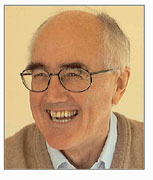A message from James
Watch the news, and every day you see proof th at the world is increasingly interlinked. Nowhere is too far away to matter, now.More than ever, we need to understand how other people and events across the world affect the way we live.
at the world is increasingly interlinked. Nowhere is too far away to matter, now.More than ever, we need to understand how other people and events across the world affect the way we live.
Take a journey on the Knowledge Web and you see how this has always been true. The modern world was shaped because of the way people and things in the past were connected.
Thanks to information technology and easier access, today’s global interactivity is also beginning to involve many more people. For the first time, everybody makes an impact.
The Knowledge Web provides an opportunity for users of all kinds and ages and interests to learn about how interactivity works. It offers the chance to experience history the way the players at the time did: full of surprise twists and turns, accidents, discoveries, friends and foes. Above all, the K-Web reveals how they never knew what was coming next. Just like you.
The Knowledge Web also shows how all knowledge is interlinked, and how applying K-Web techniques to your own situation can help you to second-guess your own future—as an individual, or a community, or a company.
Please see the Join Us link above to help make this vision a reality
— James Burke
The Vision: New ways of thinking
“Learners may study either history or physics, or perhaps only Renaissance history and astrophysics. People tend to become experts in highly specialized fields, learning more and more about less and less.”
–James Burke
James Burke has inspired a generation of teachers, students, and innovative thinkers. Perhaps best known as the author and host of the television series Connections on PBS and The Learning Channel, James has a unique ability to make complex concepts understandable to a wide audience.
James’s work explores the idiosyncratic relationships between technology, science, and social change throughout modern history. Through a variety of media—radio, television, print, and now the World Wide Web—James has brought the world a unique perspective on how all of history is interrelated and interdependent.
The Knowledge Web counters the tendency of modern education to encourage specialized learning and thinking. With formal education today, learners may study either history or physics, or perhaps only Renaissance history and astrophysics,” says James. “People tend to become experts in highly specialized fields, learning more and more about less and less.
“Unfortunately, so much specialization falsely creates the illusion that knowledge and discovery exist in a vacuum, in context only with their own disciplines, when in reality they are born from interdisciplinary connections. Without an ability to see these connections, history and science won’t be learnable in a truly meaningful way and innovation will be stifled.
As James’s television programs and published works have shown, the pieces necessary for technological breakthroughs are frequently lying around long before someone makes a connection between them. His work has pointed out many of these types of connections; the Knowledge Web and other projects of the Burke Institute will reveal even more. The aim is to put learning into a context that makes it easier to see the greater relevance of people, ideas, and events — and to inspire new ways of thinking.
